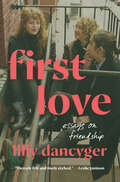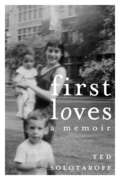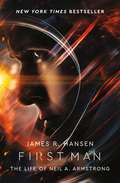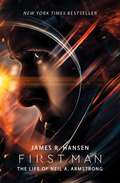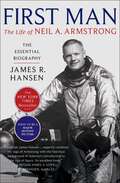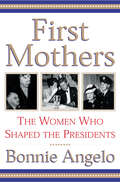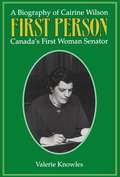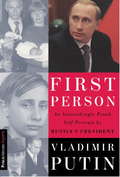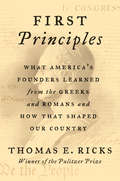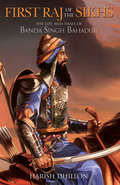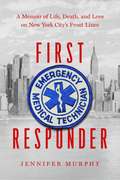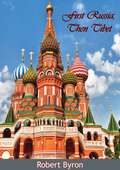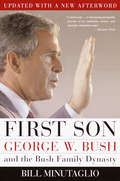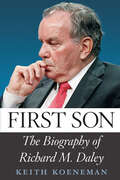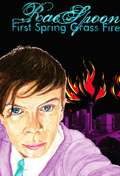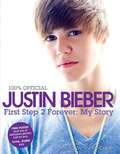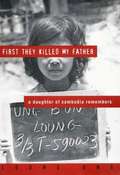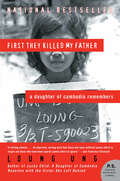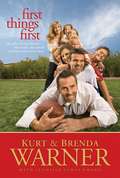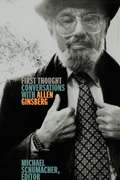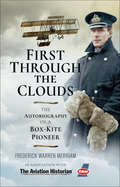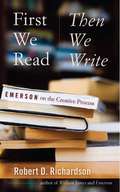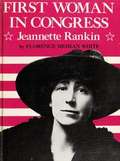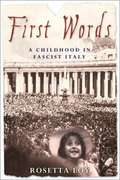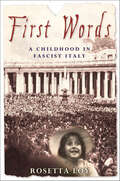- Table View
- List View
First Love: Essays on Friendship
by Lilly DancygerA bold, poignant essay collection that treats women&’s friendships as the love stories they truly are, from the critically acclaimed author of Negative Space&“Fiercely felt and finely etched.&”—Leslie Jamison, New York Times bestselling author of The Empathy ExamsLilly Dancyger always thought of her closest friendships as great loves, complex and profound as any romance. When her beloved cousin was murdered just as both girls were entering adulthood, Dancyger&’s devotion to the women in her life took on a new urgency—a desire to hold her friends close while she still could. In First Love, this urgency runs through a striking exploration of the bonds between women, from the intensity of adolescent best friendship and fluid sexuality to mothering and chosen family.Each essay in this incisive collection is grounded in a close female friendship in Dancyger&’s life, reaching outward to dissect cultural assumptions about identity and desire, and the many ways women create space for each other in a world that wants us small. Seamlessly weaving personal experience with literature and pop culture—ranging from fairy tales to true crime, from Anaïs Nin and Sylvia Plath to Heavenly Creatures and the &“sad girls&” of Tumblr—Dancyger&’s essays form a kaleidoscopic story of a life told through friendships, and an expansive interrogation of what it means to love each other.Though friendship will never be enough to keep us safe from the dangers of the world, Dancyger reminds us that love is always worth the risk, and that when tragedy strikes, it&’s our friends who will help us survive. In First Love, these essential bonds get their due.
First Loves: A Memoir
by Ted SolotaroffSolotaroff was one of the notable intellectuals of his generation, the founder of the New American Review, editor and friend of Philip Roth, and editor-in-chief at HarperCollins. Solotaroff reveals himself here as a thinking man with a big heart and gaping wounds of love that are not disconnected from the contributions he has made to American culture throughout his career. Solotaroff turns back to the earliest pages of his romance with Lynn, remembering his first sighting of her emerging from the water as if from a dream. Yet the image, as he penetrates the intervening layers of sorrow and disappointment, is almost impossibly distant, fragile. First Loves reenacts the blurring of a perfect conception in the mind of a man who would devote his life to precision of thought and word. This opposition, of romantic and intellectual passion, drives the narrative and eventually brings it to crisis.First Loves could be described as a very private feat of honesty from a public intellectual. Solotaroff's willingness to admit the failures, personal and professional, alongside the triumphs of his career gives a three-dimensional intensity to the emotions on the page. Working with all of the gritty and romantic elements of his storied life, Solotaroff manages to avoid a tone too heroic or honey-dipped; he manages simply to tell the tale.
First Man: The Life of Neil A. Armstrong
by James Hansen<p>Soon to be a major motion picture, First Man by James Hansen offers the only authorized glimpse into the life of America’s most famous astronaut, Neil Armstrong – the man whose “one small step” changed history. In First Man, Hansen explores the life of Neil Armstrong. Based on over 50 hours of interviews with the intensely private Armstrong, who also gave Hansen exclusive access to private documents and family sources, this “magnificent panorama of the second half of the American twentieth century” (Publishers Weekly, Starred Review) is an unparalleled biography of an American icon. <p>When Apollo 11 touched down on the moon’s surface in 1969, the first man on the moon became a legend. Hansen vividly recreates Armstrong's career in flying, from his seventy-eight combat missions as a naval aviator flying over North Korea to his formative transatmospheric flights in the rocket-powered X-15 to his piloting Gemini VIII to the first-ever docking in space. For a pilot who cared more about flying to the Moon than he did about walking on it, Hansen asserts, Armstrong's storied vocation exacted a dear personal toll, paid in kind by his wife and children. In the years since the Moon landing, rumors swirled around Armstrong concerning his dreams of space travel, his religious beliefs, and his private life. This book reveals the man behind the myth. In a penetrating exploration of American hero worship, Hansen addresses the complex legacy of the First Man, as an astronaut and as an individual. In First Man, the personal, technological, epic, and iconic blend to form the portrait of a great but reluctant hero who will forever be known as history's most famous space traveler.</p>
First Man: The Life of Neil A. Armstrong
by James R. HansenSoon to be a major motion picture, this is the first—and only—definitive authorized account of Neil Armstrong, the man whose “one small step” changed history.When Apollo 11 touched down on the Moon’s surface in 1969, the first man on the Moon became a legend. In First Man, author James R. Hansen explores the life of Neil Armstrong. Based on over fifty hours of interviews with the intensely private Armstrong, who also gave Hansen exclusive access to private documents and family sources, this “magnificent panorama of the second half of the American twentieth century” (Publishers Weekly, starred review) is an unparalleled biography of an American icon. In this “compelling and nuanced portrait” (Chicago Tribune) filled with revelations, Hansen vividly recreates Armstrong’s career in flying, from his seventy-eight combat missions as a naval aviator flying over North Korea to his formative trans-atmospheric flights in the rocket-powered X-15 to his piloting Gemini VIII to the first-ever docking in space. For a pilot who cared more about flying to the Moon than he did about walking on it, Hansen asserts, Armstrong’s storied vocation exacted a dear personal toll, paid in kind by his wife and children. For the near-fifty years since the Moon landing, rumors have swirled around Armstrong concerning his dreams of space travel, his religious beliefs, and his private life. A penetrating exploration of American hero worship, Hansen addresses the complex legacy of the First Man, as an astronaut and as an individual. “First Man burrows deep into Armstrong’s past and present…What emerges is an earnest and brave man” (Houston Chronicle) who will forever be known as history’s most famous space traveler.
First Man: The Life of Neil A. Armstrong
by James R. HansenMarking the forty-fifth anniversary of Apollo 11's moon landing, First Man by James Hansen offers the only authorized glimpse into the life of America's most famous astronaut, Neil Armstrong--the man whose "one small step" changed history."The Eagle has landed." When Apollo 11 touched down on the moon's surface in 1969, the first man on the moon became a legend. In First Man, Hansen explores the life of Neil Armstrong. Based on over fifty hours of interviews with the intensely private Armstrong, who also gave Hansen exclusive access to private documents and family sources, this "magnificent panorama of the second half of the American twentieth century" (Publishers Weekly, starred review) is an unparalleled biography of an American icon. Upon his return to earth, Armstrong was honored and celebrated for his monumental achievement. He was also--as James R. Hansen reveals in this fascinating and important biography--misunderstood. Armstrong's accomplishments as engineer, test pilot, and astronaut have long been a matter of record, but Hansen's unprecedented access to private documents and unpublished sources and his interviews with more than 125 subjects (including more than fifty hours with Armstrong himself) yield this first in-depth analysis of an elusive American celebrity still renowned the world over. In a riveting narrative filled with revelations, Hansen vividly recreates Armstrong's career in flying, from his seventy-eight combat missions as a naval aviator flying over North Korea to his formative transatmospheric flights in the rocket-powered X-15 to his piloting Gemini VIII to the first-ever docking in space. These milestones made it seem, as Armstrong's mother Viola memorably put it, "as if from the very moment he was born--farther back still--that our son was somehow destined for the Apollo 11 mission." For a pilot who cared more about flying to the Moon than he did about walking on it, Hansen asserts, Armstrong's storied vocation exacted a dear personal toll, paid in kind by his wife and children. For the forty-five years since the Moon landing, rumors have swirled around Armstrong concerning his dreams of space travel, his religious beliefs, and his private life. In a penetrating exploration of American hero worship, Hansen addresses the complex legacy of the First Man, as an astronaut and as an individual. In First Man, the personal, technological, epic, and iconic blend to form the portrait of a great but reluctant hero who will forever be known as history's most famous space traveler.
First Mothers: The Women Who Shaped the Presidents
by Bonnie AngeloIn this highly acclaimed book, Bonnie Angelo celebrates a group of remarkable women who played a pivotal role in developing the characters of the modern American presidents — their mothers. Angelo, a veteran reporter and writer for TIME magazine, explores the lives, thoughts and feelings of these women who so influenced the twentieth century’s most powerful leaders. From the aristocratic and formidable Sara Delano Roosevelt to diehard Democrat Martha Truman, from stoic Hannah Milhous Nixon to the hard-living Virginia Clinton Kelly, First Mothers is an in-depth look at the special mother-son relationship that has nurtured America’s presidents and helped them to achieve great things. A veteran correspondent at TIME magazine and the first woman to head a TIME foreign bureau, Bonnie Angelo has reported on the White House and presidential families throughout eight administrations. As a Washington correspondent and bureau chief in London and New York, she has covered newsmakers and major events in all fifty states and around the world. “A fascinating book, gracefully written ... gives the reader fresh insights into how the characters and values of our recent presidents were shaped.” — Washington Post Book World
First Person: A Biography of Cairine Wilson Canada's First Woman Senator
by Valerie KnowlesCairine Wilson, Canada’s first female senator, was one of nine children raised in an atmosphere of rugged Scots liberalism and strict presbyterianism by affluent Montreal parents in the late nineteenth century. She displayed an interest in politics early in life and through her father’s position in the Senate, was befriended by many notable politicians of the period, including Sir Wilfrid Laurier, an experience that left a permanent mark on her. Her appointment to the Senate in 1930 was a historic and controversial event, and launched a political career rife with passion, commitment, and reform. Wilson, whose work on behalf of refugees and the world’s needy was legendary, served in the Senate through some of the stormiest years in Canadian government history. First Person is an engaging account of a colourful and powerful politician; a fighter whose efforts were recognized by the highest officials in the land, and whose sculpted image adorns the foyer of the Canadian Senate.
First Person: An Astonishingly Frank Self-Portrait by Russia's President Vladimir Putin
by Vladimir Putin Nataliya Gevorkyan Natalya Timakova Andrei KolesnikovWho is this Vladimir Putin? Who is this man who suddenly--overnight and without warning--was handed the reigns of power to one of the most complex, formidable, and volatile countries in the world? How can we trust him if we don't know him? First Person is an intimate, candid portrait of the man who holds the future of Russia in his grip. An extraordinary compilation of over 24 hours of in-depth interviews and remarkable photographs, it delves deep into Putin's KGB past and explores his meteoric rise to power. No Russian leader has ever subjected himself to this kind of public examination of his life and views. Both as a spy and as a virtual political unknown until selected by Boris Yeltsin to be Prime Minister, Putin has been regarded as man of mystery. Now, the curtain lifts to reveal a remarkable life of struggles and successes. Putin's life story is of major importance to the world.
First Principles: What America's Founders Learned from the Greeks and Romans and How That Shaped Our Country
by Thomas E. RicksThe Pulitzer Prize-winning journalist and #1 New York Times bestselling author offers a revelatory new book about the founding fathers, examining their educations and, in particular, their devotion to the ancient Greek and Roman classics—and how that influence would shape their ideals and the new American nation. <p><p> On the morning after the 2016 presidential election, Thomas Ricks awoke with a few questions on his mind: What kind of nation did we now have? Is it what was designed or intended by the nation’s founders? Trying to get as close to the source as he could, Ricks decided to go back and read the philosophy and literature that shaped the founders’ thinking, and the letters they wrote to each other debating these crucial works—among them the Iliad, Plutarch’s Lives, and the works of Xenophon, Epicurus, Aristotle, Cato, and Cicero. For though much attention has been paid the influence of English political philosophers, like John Locke, closer to their own era, the founders were far more immersed in the literature of the ancient world. <p> The first four American presidents came to their classical knowledge differently. Washington absorbed it mainly from the elite culture of his day; Adams from the laws and rhetoric of Rome; Jefferson immersed himself in classical philosophy, especially Epicureanism; and Madison, both a groundbreaking researcher and a deft politician, spent years studying the ancient world like a political scientist. Each of their experiences, and distinctive learning, played an essential role in the formation of the United States. In examining how and what they studied, looking at them in the unusual light of the classical world, Ricks is able to draw arresting and fresh portraits of men we thought we knew. <p> First Principles follows these four members of the Revolutionary generation from their youths to their adult lives, as they grappled with questions of independence, and forming and keeping a new nation. In doing so, Ricks interprets not only the effect of the ancient world on each man, and how that shaped our constitution and government, but offers startling new insights into these legendary leaders. <p> <b>A New York Times Bestseller</b>
First Raj of the Sikhs: The Life and Times of Banda Singh Bahadur
by Harish DhillonBanda Singh Bahadur appeared in Sikh history for a relatively short period (1708-1716) but, after the Sikh gurus, influenced it more significantly than any other individual. Banda Singh Bahadur is among the most colourful and fascinating characters in Sikh history. From an ascetic he was transformed into Guru Gobind Singh’s most trusted disciple. So much so that when the seriously injured guru could not lead his Sikh army against the Mughal forces, he appointed Banda Singh Bahadur as his deputy. As proof of this appointment he gave Banda his sword, a mighty bow, arrows from his own quiver, his battle standard and his war drum. Banda rode out from Nanded (where Guru Gobind Singh passed away; now in Maharashtra) at the head of a small band of Sikhs, which, by the time it reached the Punjab, had grown into a formidable army. Over the next few years his exploits against the Mughal rulers, both in pitched battles and in skirmishes, became the stuff of legends. He became the first of many legendary Sikh generals, famous both for their personal heroic courage and their skill in warfare. His many encounters with the Mughal rulers eroded the very foundation of the Mughal empire and ensured its quick demise. As he said when questioned on what he had achieved: ‘I have ensured that never again will the crown sit easily on the Mughal emperor’s head.’ He also prepared the coming generations of Sikhs for future conflicts, which later greatly helped Maharaja Ranjit Singh in creating a Sikh empire. Banda was a true leader who led from the front, not only in the battlefield but also in civil administration. He established a secular government which swept aside 700 years of slavery and the myth of domination by foreign powers, proclaimed freedom of worship, allowed the people to follow professions of their choice and stopped forcible marriages even while recovering abducted women for return to their families. His land revolution abolished zamindari in parts of North India, thereby redistributing land equally amongst the tillers. This book seeks to tell the story of this remarkable and brave man and his equally remarkable ahievements. Perhaps, the finest of Banda Singh Bahadur’s biographies.
First Responder: Life, Death, and Love on New York City's Frontlines: A Memoir
by Jennifer MurphyOne woman's incredible story of life on the front lines as an emergency medical worker in New York City.On the streets of New York City, EMTs and paramedics do more than respond to emergencies; they eat and drink together, look out for each other&’s safety, mercilessly make fun of one another, date one other, and, most crucially, share terrifying experiences and grave injustices suffered under the city&’s long-broken EMS system. Their loyalty to one another is fierce and absolute. As Jennifer Murphy shows in the gripping and moving First Responder, they are a family. A dysfunctional family, perhaps, but what family isn't? Many in the field of pre-hospital emergency care have endured medical trauma and familial hardship themselves. Some are looking to give back. Some are desperate for family. Some were inspired by 9/11. Still others want to become doctors, nurses, firefighters, cops, and want to cut their teeth on the streets. As rescuers, they never want people to die or get hurt. But if they are going to die or get hurt, first responders want to be there. Despite the vital role they play New York City, EMTs are paid less than trash collectors, and far less than any other first responder makes, even though the burden of medical emergencies fall on the backs of EMTs and medics. Yet for Jennifer and her brothers and sisters, it's a calling more than a job. First responders are constantly exposed to infectious diseases, violence, and death. The coronavirus pandemic did not change that math; the public is just more aware of it. After 9/11, EMT training schools experienced a surge in applications from civilians wanting to become first responders, inspired by rescuers who responded to the terrorist attacks and rushed into the burning towers when everyone else ran out. The same will almost certainly be true post-coronavirus as people are moved by a desire to help in times of crisis in a more direct way. Funny and heartwarming, inspiring and poignant, First Responder follows Jennifer's journey to becoming an EMT and working during and beyond the Covid-19 pandemic. She will bring readers inside an intense world filled with crisis, rescue, grief, uncertainty, and dark humor. First Responder will move readers to a greater understanding and appreciation of those fighting for them—wherever they live—in a world they hardly know or could imagine.
First Russia, Then Tibet [Illustrated Edition]
by Robert ByronOver the course of several months during 1931 and 1932, Robert Byron journeyed to three countries teetering on the brink of change.In Russia, which was stricken by famine, Lenin had just died, Stalin's dictatorship was in its infancy and the Great Terror had yet to begin. Having taken the first commercial flight to India, which took an astounding seven days, Byron was thrown into the tumultuous last years of the British Raj. Gandhi was imprisoned, while rioting and clashes between Hindus and Muslims had become commonplace. Finally Byron entered Tibet, the forbidden country. Exploring "The Land of Snows", he saw Tibet as it was when the then Dalai Lama was still ensconced in the Potala Palace, twenty years before China's invasion.First Russia, Then Tibet is an invaluable first-hand account of transformative moments in periods of change and upheaval.-Print ed.Richly illustrated throughout.
First Son: George W. Bush and the Bush Family Dynasty
by Bill MinutaglioMinutaglio, a Texas journalist who has worked for some of the state's major newspapers, tells the story of a powerful political family, beginning with the turn-of-the-century emergence of the influential Bush-Walker clan and of Prescott Bush, the Connecticut patrician who ingrained in his family an ethos that continues to exert influence on his son, former President George Bush, and his grandsons Jeb and George W. Bush. How these scions of the Bush dynasty struggle to live up to their legacy is the cen...
First Son: The Biography of Richard M. Daley
by Keith KoenemanMayor Richard M. Daley dropped the bomb at a routine news conference at City Hall on Tuesday. With no prelude or fanfare, Mr. Daley announced that he would not seek re-election when his term expires next year. 'Simply put, it's time, ' he said. a"New York Times, September 7, 2010"With those four words, an era ended. After twenty-two years, the longest-serving and most powerful mayor in the history of ChicagoOCoand, arguably, AmericaOCostepped down, leaving behind a city that was utterly transformed, and a complicated legacy we are only beginning to evaluate. Ina"First Son," Keith Koeneman chronicles the sometimes Shakespearean, sometimes Machiavellian life of an American political legend. Making deft use of unprecedented access to key players in the Daley administration, as well as Chicago's business and cultural leaders, Koeneman draws on more than one hundred interviews to tell an up-close, insider story of political triumph and personal evolution. With Koeneman as our guide, we follow young Daley from his beginnings as an average Bridgeport kid thought to lack his father's talent and charisma to his unlikely transformation into an iron-fisted leader. Daley not only escaped the giant shadow of his father but also transformed Chicago from a gritty, post-industrial Midwestern capital into a beautiful, sophisticated global city widely recognized as a model for innovative metropolises throughout the world. But in spite of his many accomplishments, Richard M. Daley's record is far from flawless. a"First Son"asets the dramatic improvement of certain parts of the city against the persistent realities of crime, financial stress, failing public housing, and dysfunctional schools. And it reveals that while in many ways Daley broke with the machine politics of his father, he continued to reward loyalty with favors, use the resources of city government to overwhelm opponents, and tolerate political corruption. A nuanced portrait of a complex man, a"First Son"ashows Daley to be sensitive yet tough, impatient yet persistent, a street-smart fighter and detail-driven policy expert who not only ran Chicago, buta"was"aChicago.
First Spring Grass Fire
by Rae SpoonTransgender indie electronica singer-songwriter Rae Spoon has six albums to their credit, including 2012's I Can't Keep All of Our Secrets. This first book by Rae (who uses "they" as a pronoun) is a candid, powerful story about a young person growing up queer in a strict Pentecostal family in rural Canada.The narrator attends church events and Billy Graham rallies faithfully with their family before discovering the music that becomes their salvation and means of escape. As their father's schizophrenia causes their parents' marriage to unravel, the narrator finds solace and safety in the company of their siblings, in their nascent feelings for a girl at school, and in their growing awareness that they are not the person their parents think they are. With a heart as big as the prairie sky, this is a quietly devastating, heart-wrenching coming-of-age book about escaping dogma, surviving abuse, finding love, and risking everything for acceptance.Rae Spoon lives in Montreal, Quebec.
First Step 2 Forever: My Story
by Justin Bieber"It's a big, big world It's easy to get lost in it..." -Justin Bieber, "Up". I love those lines in the lyrics. Sometimes I feel like that's what everyone's expecting. My world got very big, very fast, and a lot of people expect me to get lost in it. I grew up in a small town in Canada. I taught myself to sing in front of my bedroom mirror and to play guitar on a hand-me-down. My mom posted my first videos on YouTube. Never in my wildest dreams did I think that I'd sell millions of records, sing for the president of the United States and sell out a massive arena tour. So no, I'm not lost. Not at all. If anything, onstage in front of my fans, I'm home. I'm found. And that's what this book is about: my journey, from singing and busking on the sidewalk in Stratford, Ontario, to performing and showing my appreciation to millions of fans all over the world for making this dream a reality. My music and lyrics give a glimpse of what's in my heart, but I think this book is a window into my world. In here are hundreds of pictures of me that no one's ever seen before, and I'll tell you about who I was before I joined forces with Scooter Braun and Usher and got a record deal, and who I've become since I've been blessed with the opportunity to share my music with the world. This is my gift to you, the fans who've supported and been with me on this amazing journey every step of the way.
First They Killed My Father: A Daughter of Cambodia Remembers
by Loung UngUntil the age of five, Lounge Ung lived in Phnom Penh, one of seven children of a high-ranking government official. She was a precocious child who loved the open city markets, fried crickets, chicken fights, and sassing her parents. While her beautiful mother worried that Loung was a troublemaker -- that she stomped around like a thirsty cow -- her beloved father knew Loung was a clever girl. When Pol Pot's Khmer Rouge army stormed into Phnom Penh in April 1975, Ung's family fled their home and moved from village to village to hide their identity, their education, their former life of privilege. Eventually, the family dispersed in order to survive. Because Loung was resilient and determined, she was trained as a child soldier in a work camp for orphans, while other siblings were sent to labor camps.
First They Killed My Father: A Daughter of Cambodia Remembers
by Loung UngOne of seven children of a high-ranking government official, Loung Ung lived a privileged life in the Cambodian capital of Phnom Penh until the age of five. Then, in April 1975, Pol Pot's Khmer Rouge army stormed into the city, forcing Ung's family to flee and, eventually, to disperse. Loung was trained as a child soldier in a work camp for orphans, her siblings were sent to labor camps, and those who survived the horrors would not be reunited until the Khmer Rouge was destroyed. Harrowing yet hopeful, Loung's powerful story is an unforgettable account of a family shaken and shattered, yet miraculously sustained by courage and love in the face of unspeakable brutality.
First Things First
by Kurt Warner Brenda WarnerStarting with "The Rules of Being a Warner," this book outlines the rules, principles, and goals of Kurt Warner, quarterback for the Arizona Cardinals, his wife Brenda, and their seven children.
First Thought: Conversations with Allen Ginsberg
by Michael Schumacher&“The way to point to the existence of the universe is to see one thing directly and clearly and describe it. . . . If you see something as a symbol of something else, then you don't experience the object itself, but you're always referring it to something else in your mind. It's like making out with one person and thinking about another.&” —Ginsberg speaking to his writing class at Naropa Institute, 1985With &“Howl&” Allen Ginsberg became the voice of the Beat Generation. It was a voice heard in some of the best-known poetry of our time—but also in Ginsberg&’s eloquent and extensive commentary on literature, consciousness, and politics, as well as his own work. Much of what he had to say, he said in interviews, and many of the best of these are collected for the first time in this book. Here we encounter Ginsberg elaborating on how speech, as much as writing and reading, and even poetry, is an act of art.Testifying before a Senate subcommittee on LSD in 1966; gently pressing an emotionally broken Ezra Pound in a Venice pensione in 1967; taking questions in a U.C. Davis dormitory lobby after a visit to Vacaville State Prison in 1974; speaking at length on poetics, and in detail about his &“Blake Visions,&” with his father Louis (also a poet); engaging William Burroughs and Norman Mailer during a writing class: Ginsberg speaks with remarkable candor, insight, and erudition about reading and writing, music and fame, literary friendships and influences, and, of course, the culture (or counterculture) and politics of his generation. Revealing, enlightening, and often just plain entertaining, Allen Ginsberg in conversation is the quintessential twentieth-century American poet as we have never before encountered him: fully present, in pitch-perfect detail.
First Through The Clouds: The Autobiography of a Box-Kite Pioneer
by Frederick Warren MerriamThe early years of aviation were marked by flimsy, unreliable machines and daring adventurous young men. One of the pioneer aviators leading the way in Britain was F. Warren Merriam who, following Louis Blriots first flight across the Channel in 1809, joined the Bristol and Colonial Aeroplane Company through which he obtained a Royal Aero Clubs aviators certificate.Much of the flying training in those early days was a case of the blind leading the blind and, as Merriam wrote, Flying was a dangerous business then. Airplanes were constantly breaking up in the air let alone on takeoff and landing; there were no parachutes and the pilots were ever expectant of mishaps. This was hardly the career for a decent young man and for a long time he had to keep his flying a secret from his parents.Aviation did indeed develop into a career, with Merriam becoming a certified instructor at Brooklands aerodrome. There he taught many of the men who became pioneers in aviation and others who joined the Royal Flying Corps that crossed to France in the early months of the First World War.The term pioneer could also be ascribed to Merriam for he was the first person in Britain to fly through the clouds. Until that day in 1912, it had been assumed that pilots would always stay within sight of the ground. Why would anyone want to go so high?This entertaining autobiography takes the reader on a journey through Merriams early flying career, from how it started through his first shaky solo, through a series of crashes into his First World War service. His account is the story of the early history of aviation, the development of aircraft and the personalities that led the way in those exciting, if risk-strewn days of yore.
First We Read, Then We Write: Emerson on the Creative Process
by Robert D. Richardson[From the dust jacket:] "Writing was the central passion of Emerson's life. While his thoughts on the craft are well developed in "The Poet," "The American Scholar,"Nature, "Goethe," and "Persian Poetry," less well known are the many pages in his private journals devoted to the relationship between writing and reading. Here, for the first time, is the Concord Sage's energetic, exuberant, and unconventional advice on the idea of writing, focused and distilled by the preeminent Emerson biographer at work today. Emerson advised that "the way to write is to throw your body at the mark when your arrows are spent. "First We Read, Then We Writecontains numerous such surprises-from "every word we speak is million-faced" to "talent alone cannot make a writer"-but it is no mere collection of aphorisms and exhortations. Instead, in Robert Richardson's hands, the biographical and historical context in which Emerson worked becomes clear. Emerson's advice grew from his personal experience; in practically every moment of his adult life he was either preparing to write, trying to write, or writing. Richardson shows us an Emerson who is no granite bust but instead is a fully fleshed, creative person disarmingly willing to confront his own failures. Emerson urges his readers to try anything-strategies, tricks, makeshifts-speaking not only of the nuts and bolts of writing but also of the grain and sinew of his determination. Whether a writer by trade or a novice, every reader will find something to treasure in this volume. Fearlessly wrestling with "the birthing stage of art," Emerson's counsel on being a reader and writer will be read and reread for years to come."
First Woman In Congress: Jeannette Rankin
by Florence Meiman WhiteA biography of the first woman elected to Congress, who spent the 92 years of her life as a leader for woman suffrage, a lobbyist, and a social reformer.
First Words: A Childhood in Fascist Italy
by Gregory Conti Rosetta Loy<P>In 1937, Rosetta Loy was a privileged five-year-old growing up among the well-to-do Catholic intelligentsia of Rome. But her childhood world of indulgent nannies and summers in the mountains was also the world of Mussolini's fascist regime and the increasing oppression of Italian Jews. <P>Loy interweaves the two Italys of her early years, revealing the willful ignorance of her own family as one by one their Jewish neighbors disappeared. She indicts journalists and intellectuals for their blindness and passivity, and presents a searing and dispassionate record of the role of the Vatican and Catholic leadership in the devastation of Italian Jewry.
First Words: A Childhood in Fascist Italy
by Rosetta LoyAn internationally acclaimed novelist and journalist movingly chronicles her childhood in Rome during World War II, providing a rare account by a Catholic of Jewish persecution and Papal responsibility In 1937, Rosetta Loy was a privileged five-year-old growing up in the heart of the well-to-do Catholic intelligentsia of Rome. But her childhood world of velvet and lace, airy apartments, indulgent nannies, and summers in the mountains was also the world of Mussolini's fascist regime and the increasing oppression of Italian Jews. Loy interweaves the two Italys of her early years, shifting with powerful effect from a lyrical evocation of the many comforts of her class to the accumulation of laws stipulating where Jews were forbidden to travel and what they were not allowed to buy, eat, wear, and read. She reveals the willful ignorance of her own family as one by one their neighbors disappeared, and indicts journalists and intellectuals for their blindness and passivity. And with hard-won clarity, she presents a dispassionate record of the role of the Vatican and the Catholic leadership in the devastation of Italy's Jews.Written in crystalline prose, First Words offers an uncommon perspective on the Holocaust. In the process, Loy reveals one writer's struggle to reconcile her memories of a happy childhood with her adult knowledge that, hidden from her young eyes, one of the world's most horrifying tragedies was unfolding.
